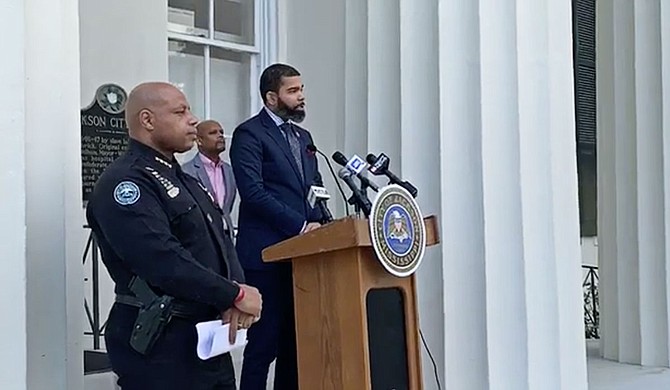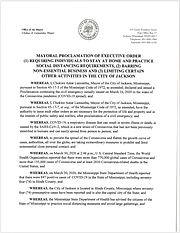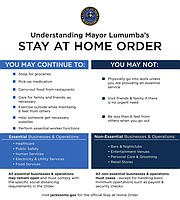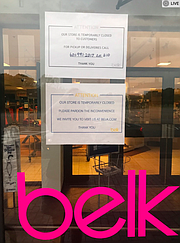On April 1, Jackson Mayor Chokwe A. Lumumba announced a city-wide stay-at-home order, effective from April 3 until April 17. Courtesy City of Jackson. It beings at midnight Friday, April 3, and will last until 11:59 p.m. on April 17. Photo courtesy City of Jackson
Just hours before Gov. Tate Reeves changed course and issued a statewide shelter-in-place order on April 1 to supersede his weaker March 24 executive order to respond to the COVID-19 spread in Mississippi, Jackson Mayor Chokwe A. Lumumba emailed to the media a detailed replacement to his own earlier order. Both were considerably stronger and similar in language.
Both men explained their stronger orders later in the day, with Lumumba going first by half an hour. He stood before reporters in front of City Hall to both get tough with violators of his first order and to announce a detailed lockdown of the capital city, except for businesses and operations deemed essential, ahead of a state-wide lockdown.
The order, which goes into effect at midnight on this Friday, April 3, and will last until 11:59 p.m. on April 17, presents a markedly more strict approach than the mayor had declared on March 16 and amended two days later. Previously, the City had issued a ban on public gatherings of 10 or more people, limited restaurant operations to take-out and delivery service, closed bars and nightclubs, and he ordered non-essential City employees to work remotely.
Under Lumumba’s stay-at-home order, Jackson residents must remain indoors and travel only to fulfill essential needs, such as buying groceries or medicine and other crucial supplies, caring for a family member and going into work but only if their place of employment counts as an essential business.
At the streamed press conference, Lumumba explained that he devised the order after consulting with the City of Jackson’s COVID-19 Task Force, which consists of several health-care professionals and other experts. His administration drafted the 11-page order after reviewing COVID-19 data trends in Mississippi and Centers for Disease Control guidelines.
The Mississippi State Department of Health reported 1,177 total cases of COVID-19 and 26 deaths as of 6 p.m., April 1. In Hinds County alone, at least 118 people have contracted the virus.
Lumumba Calls for Uniform Order from State, Which Followed
Lumumba reiterated his earlier call for a uniform state-wide approach to curbing COVID-19 in the State of Mississippi at the announcement. He pointed out, as he had during a recently televised appearance on MSNBC, that Jackson is not only the most densely populated city in Mississippi and the capital of the state, but also the health-care hub of the state.
“We are the capital of health care, so if those people are endangered in those (other) cities, they are likely to come to Jackson to our health facilities, creating further strain on those health-care officials and professionals,” the mayor said. “So we want everyone to exercise the greatest level of due diligence and preparation in the midst of this global pandemic.
“It is not my measure or my effort to get into a political battle at this time,” the mayor added, likely alluding to the tension between his administration’s approach and that of Reeves. The week before, however, Lumumba had praised Reeves after the governor told mayors they could strengthen rules locally, including closing non-essential businesses, but the realities of inconsistent local policies became clear in the days that followed.
Reeves released his new shelter-at-home order soon after the mayor’s press conference.
Lumumba also confirmed that the governor had not collaborated with his administration on his orders: “If you’re asking me whether the governor has called me about Jackson being a hotspot: no,” the mayor explained to a reporter.
Confusion, Conflicting State Orders
The governor’s original March 24 executive order superseded, confused and at times undermined local mayors’ efforts to contain the outbreak in their cities. Reeves’ order also included a long list of exempt essential businesses, which includes churches and gun stores, as well as exempting department stores, shopping centers and even offices from his 10-people-or-fewer gathering requirement.
In the absence of a state-wide policy to mitigate COVID-19 risks, municipalities throughout Mississippi have employed differing approaches to dealing with the pandemic. In Flowood, a nearby suburb of Jackson, for example, residents could dine inside restaurants, and go to nail salons, barbershops, gyms and other personal grooming venues—provided those venues limited gatherings to fewer than 10 people—as recently as March 31.
Department stores in the state, too, occupied a murky area since the coronavirus outbreak. Without including them in his explicit “essential” list, Reeves had exempt them from the gathering requirement in March 24 executive order. That allowed them to remain open and without limiting numbers of customers, even if they did not sell “essential” items—unless local officials regulated them. As written, it wasn’t clear whether they could legally, however.
That also left vast inconsistencies between how, for instance, Jackson and its suburbs regulated open businesses and social distancing.
“This is a much more serious thing that we are dealing with,” Lumumba stressed Wednesday. “And so I am just calling on us to care for our mothers and fathers, our grandmothers and grandfathers, our sisters and brothers, collectively, wherever you are, and put in the most restrictive, the most thought-out plan that we possibly can.”
Fallout of Tate Reeves’ Executive Order: Department Store Roulette, Scared Associates
Some associates are scared because the governor's original executive order created a gray area for department stores and shopping centers it did not explicitly call "essential" but were still exempt from social-distancing requirements.
“I think that requires that we work in tandem with one another as opposed to a fragmented stance on how we deal with (this),” the mayor added.
Essential v. Non-Essential Businesses, Operations
While all entertainment venues (zoos, bars, taverns, adult entertainment venues, movie theaters, music halls and more) and personal grooming businesses (including barbershops, nail salons, tattoo parlors) must close, Lumumba’s order says that restaurants can remain open only for drive-thru, delivery or take-out service, which Reeves’ new order says as well.
Only if they serve food can bars and taverns remain open for drive-thru, delivery or take-out food service. Most bars in Mississippi, in fact, serve food in order to legally serve liquor unless in a resort area.
The City closed public parks due to overcrowding in them, but Lumumba said residents are encouraged to take walks, ride their bikes and continue other forms of exercise while following the social distancing requirements outlined in the order, including standing 6 feet away from people they don’t live with.
Employees of essential businesses can still go to work in Jackson, and essential government functions, including payroll and security checks, will continue under the order. Lumumba’s order made it clear that all of the essential businesses listed in Reeves’ executive order, which explicitly supersedes local essential rules, are exempt in his order as well.
Non-essential businesses and operations, however, must cease, Lumumba said. At the April 1 press conference, Lumumba also told reporters that his administration did not consider gun shops to be essential businesses.
“I want it to be known that all the things we have spoken to as being either essential or non-essential wasn’t by our own choosing,” Lumumba explained. “It wasn’t by us deciding that we value this more so than another operation. We know there is financial strain on our citizens and our businesses at this time, so we’re doing all that we can to flatten the curve, so that we can restore safety for everyone and that we can restore back to normal operations,” he said.
JATRAN will continue its operations, because it provides an essential service, the mayor said. The City buses are the only form of transportation available to many residents, who rely on them to go to the grocery store or medical appointments. Lumumba clarified that riders could only enter the buses through the back, that buses had implemented barriers between drivers and passengers, and JATRAN buses were operating with reduced passengers—all efforts to mitigate virus spread.
The mayor said that while he reserves the right to implement a curfew at a later time, he has not yet done so as a way to reduce overcrowding at grocery stories and other essential businesses during certain hours.
Daycare centers, also designated as essential businesses, could remain open, because they fill the childcare needs of many essential employees who must still work during the pandemic. They are required to follow social-distancing protocols.
However, the mayor pointed out that daycares could close if they decided it was not in their best interest to continue operating.
‘We Have Legal Authority to Cut Your Power Off’
Essential travel is permitted under Lumumba’s stay-at-home order. He added that Jackson Police Department’s roadblock program would remain suspended, and that the City was relying on good faith in residents and citizen cooperation to ensure that the order works.
COVID-19 Information Mississippians Need
Read breaking coverage of COVID-19 in Mississippi, plus safety tips, cancellations, more in the JFP's archive.
Police officers will continue to monitor large gatherings and patrol non-essential business areas as well as the operations of essential businesses, including churches, which are allowed to remain open under the stay-at-home order due to Reeves’ previous executive order. Reeves said at his later press conference announcing his shelter-at-home order that while he did not believe that the government should order churches closed, he does apply his 10-or-fewer gathering limitation to churches.
Lumumba urged all area churches to shift toward digital prayer services, as it is virtually impossible for churches—which have dozens or hundreds in their congregations—to observe social-distancing protocols.
At a March 30 press conference, Lumumba vowed that his administration would crack down on people and businesses in violation of his March 16 executive orders.
“(Not) only will we shut you down in the strictest ways, we have legal authority to cut your power off,” Lumumba said. “So we’re going to cut your power off, and we will do everything that we can to make certain that you know we are not playing, and we will make it difficult for you to open back once this pandemic is done.”
Goal Is Not to Incarcerate, Criminalize
On April 1, the mayor thanked residents and businesses that have worked hard to ensure their own safety and the safety of their fellow community members, but he reiterated that those who violated the stay-at-home order would suffer consequences.
“We know there have been a small minority that have not abided by the previous orders, and that leaves us all in danger and threatens the safety of us all,” the mayor said.
Yusef Salaam Warns Hinds, Mississippi About COVID-19 Risks Behind Bars
As Jackson and Hinds County resisted changes in arrest policy, a member of the Exonerated 5 explained to Seyma Bayram what they could face without them.
Though state statute permits fines of up to $300 for violations, and people can be charged with misdemeanors, the mayor stressed to the public that incarcerating and criminalizing residents were not his administration’s intended goals.
“I want to emphasize that our goal is not to incarcerate, our goal is not to criminalize. Our goal is the health and safety of residents,” the mayor said, adding that the City of Jackson was working with Hinds County to address the local jail population, which is at particularly high risk for contracting and spreading the disease.
Nevertheless, the mayor urged residents, especially young people, to honor the stay-at-home order. He alluded to recent block parties and cruising in parking lots as examples of activities that endangered the community.
“This is not the time. We don’t want young people to believe that they are invincible,” Lumumba said, noting that while young people are not at high risk of suffering complications from the disease, they can still be carriers. “They don’t want to hurt mom, they don’t want to hurt dad. They don’t want to hurt grandma or grandpa,” he said.
“We can’t be everywhere, so we are counting on citizens,” he said.
Read the JFP’s coverage of COVID-19 at jacksonfreepress.com/covid19. Get more details on preventive measures here. Read about announced closings and delays in Mississippi here. Read MEMA’s advice for a COVID-19 preparedness kit here.
Email information about closings and other vital related logistical details to [email protected].
Email state reporter Nick Judin, who is covering COVID-19 in Mississippi, at [email protected] and follow him on Twitter at @nickjudin. Seyma Bayram is covering the outbreak inside the capital city and in the criminal-justice system. Email her at [email protected] and follow her on Twitter at @seymabayram0.
More stories by this author
- City Announces Robinson Road Repaving Project; Stay-At-Home Order Still in Effect
- City of Jackson Sues Canadian National Railway Over Blocked Railroad Underpass
- Mayor Lumumba Revises, Extends Jackson Stay-at-Home Order
- Mississippi Justice Institute Sues Mayor Lumumba for Open-Carry Order
- Jackson Attorney with COVID: ‘A False Sense of Protection Here’








Comments
Use the comment form below to begin a discussion about this content.
comments powered by Disqus